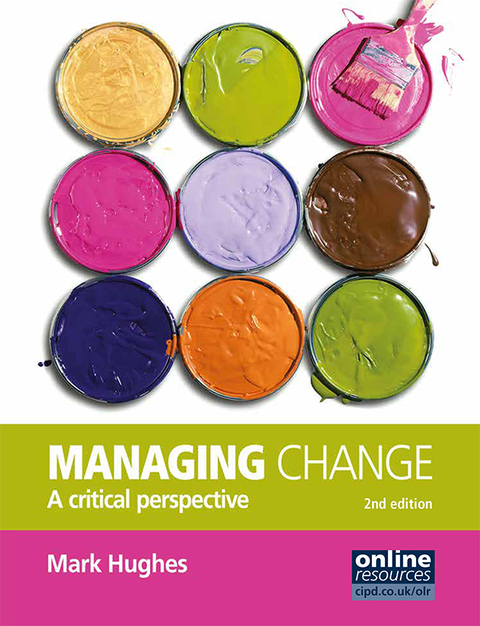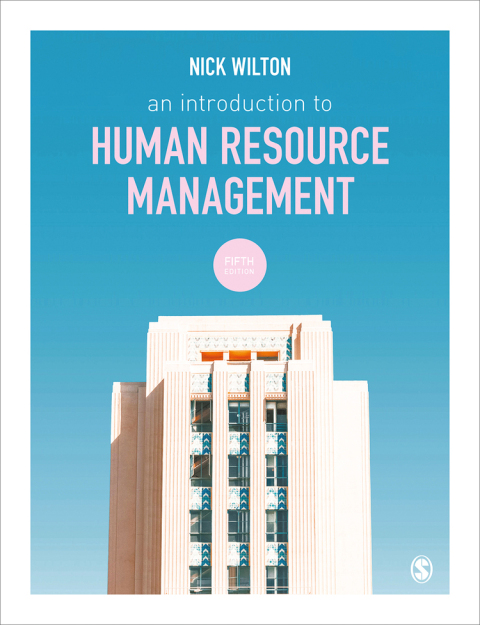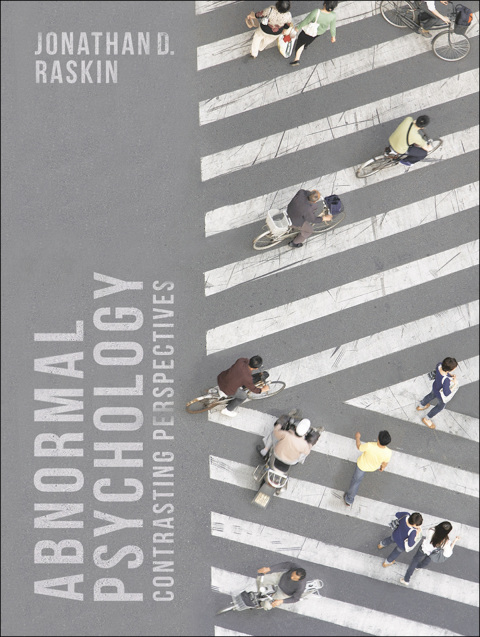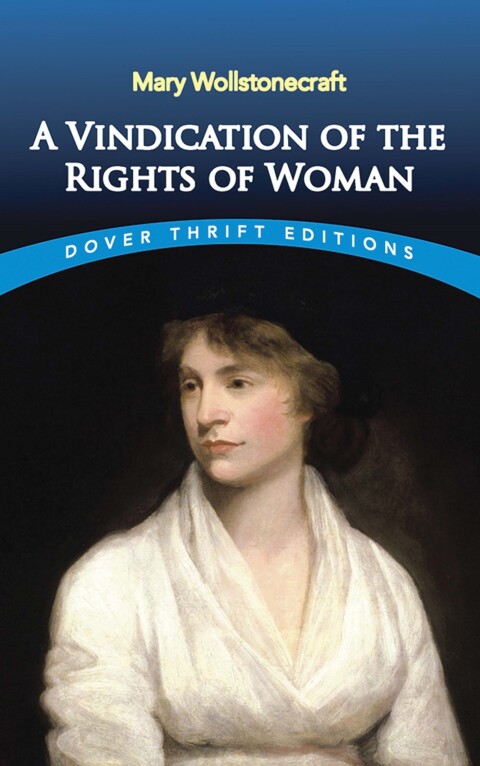Description
Efnisyfirlit
- Cover
- Title
- List of figures
- List of boxes
- Journal research cases
- Acknowledgements
- Preface to the second edition
- The purpose of the book
- The approach of the book
- The organisation of the chapters
- The organisation of the book
- Walkthrough of textbook features
- Part 1 Introduction
- Chapter 1 The managing change conundrums
- Introduction
- The managing change conundrums
- Summary
- Key readings
- Chapter 2 Organisational change classifications
- Learning outcomes
- Introduction
- Managerial approaches
- – Classifying organisational change
- – The change classifications framework
- Critical perspective
- – The change classifications framework as a point of view
- – Complexity theories and organisational change
- – Postmodernism and organisational change
- Concluding commentary
- Case study: applying theory to practice
- – Greenshires County Council in shock restructuring
- Discussion questions
- Key readings
- Chapter 3 History and organisational change
- Learning outcomes
- Introduction
- Managerial approaches
- – Popular management writing
- Critical perspective
- – Historiography and organisational change
- Concluding commentary
- Case study: applying theory to practice
- – Reflecting upon the NHS Next Stage Review
- Discussion questions
- Key readings
- Chapter 4 The role of paradigms and perspectives
- Learning outcomes
- Introduction
- Managerial approaches
- – Paradigms of/for change
- – Perspectives on organisational change
- Critical perspective
- – What constitutes a critical perspective?
- – Why adopt a critical perspective towards managing change?
- Concluding commentary
- Case study: applying theory to practice
- – Identifying perspectives and paradigms in four journal papers
- Discussion questions
- Key readings
- Part 2 External And Internal Change Contexts
- Chapter 5 Why organisations change
- Learning outcomes
- Introduction
- Managerial approaches
- – Triggers and drivers of organisational change
- – Contextualist approaches to organisational change
- Critical perspective
- – Life-cycles, teleology, dialectics and evolution
- – New institutional theory
- – Management fads and fashions
- Concluding commentary
- Case study: applying theory to practice
- – Changing times at Factory Bank
- Discussion questions
- Key readings
- Chapter 6 Organisational design and change
- Learning outcomes
- Introduction
- Managerial approaches
- – The challenges of organisational design
- – Theorising organisational design
- – Changing forms, processes and boundaries
- Critical perspective
- – Dualities in forms of organising
- Concluding commentary
- Case study: applying theory to practice
- – New organisational forms at the University of Midchester
- Discussion questions
- Key readings
- Chapter 7 Strategic-level change
- Learning outcomes
- Introduction
- Managerial approaches
- – Strategy and strategic change
- – Planned approaches to change
- – Managing mergers and acquisitions
- Critical perspective
- – Emergent approaches to change
- – Questioning strategic change
- – Critically reviewing mergers and acquisitions
- Concluding commentary
- Case study: applying theory to practice
- – Strategic change at Higson’s Plastic Parts
- Discussion questions
- Key readings
- Chapter 8 Group- and team-level change
- Learning outcomes
- Introduction
- Managerial approaches
- – Groups and teams in organisations
- – Group and team involvement in organisational change
- – Socio-technical systems approaches
- Critical perspective
- – Critique of groups and teams research
- – The tyranny of teamworking ideology
- Concluding commentary
- Case study: applying theory to practice
- – All change in the technical support team
- Discussion questions
- Key readings
- Chapter 9 Individual-level change
- Learning outcomes
- Introduction
- Managerial approaches
- – Understanding individuals
- – Explaining processes of individual change
- – Managing individuals through organisational change
- Critical perspective
- – Covert dimensions of organisational change
- – Questioning the role of pain in organisational change
- Concluding commentary
- Case study: applying theory to practice
- – Experiencing change in Greenshires County Council
- Discussion questions
- Key readings
- Part 3 Managing Change
- Chapter 10 The leadership of change
- Learning outcomes
- Introduction
- Managerial approaches
- – Leaders, leadership and management
- – Studying leaders and leadership
- – Transformational and visionary leadership
- – Leading change
- Critical perspective
- – Critique of Kotter and transformational leadership
- – Leadership as dangerous, dysfunctional and devious
- Concluding commentary
- Case study: applying theory to practice
- – Leading change in Crusty Bakeries
- Discussion questions
- Key readings
- Chapter 11 Change communications
- Learning outcomes
- Introduction
- Managerial approaches
- – Communicating change
- – Communicating change barriers and blockages
- Critical perspective
- – Change communications as rhetoric
- – Change communications as discourse
- Concluding commentary
- Case study: applying theory to practice
- – Communications about a new job evaluation scheme
- Discussion questions
- Key readings
- Chapter 12 Resistance to change
- Learning outcomes
- Introduction
- Managerial approaches
- – The what, why and how of resisting change
- – Managing resistance to change
- Critical perspective
- – Change and stability
- – Change-agent-centric thinking
- – Rethinking resistance and resistance terminology
- Concluding commentary
- Case study: applying theory to practice
- – Resistance to change in Happy Homes call centre
- Discussion questions
- Key readings
- Chapter 13 Cultural change
- Learning outcomes
- Introduction
- Managerial approaches
- – National cultural contexts
- – Managerial interest in organisational culture
- – Defining and classifying organisational cultures
- – Managing cultural change
- Critical perspective
- – The manageability of cultural change?
- – Culture as an impediment to organisational change
- Concluding commentary
- Case study: applying theory to practice
- – Midlands Building Society
- Discussion questions
- Key readings
- Chapter 14 Organisational learning
- Learning outcomes
- Introduction
- Managerial approaches
- – Approaches to learning
- – Organisational learning
- – The learning organisation
- Critical perspective
- – Critically reviewing organisational learning and learning organisations
- – Organisational forgetting
- Concluding commentary
- Case study: applying theory to practice
- – Manufacturing videotapes: fast-forward to the future
- Discussion questions
- Key readings
- Part 4 Developments In Managing Change
- Chapter 15 Power, politics and organisational change
- Learning outcomes
- Introduction
- Managerial approaches
- – Theorising power and politics
- – Power, politics and organisational change
- Critical perspective
- – Power: a radical view
- – Power and strategic change
- Concluding commentary
- Case study: applying theory to practice
- – Funding crisis at Musicians in the Community
- Discussion questions
- Key readings
- Chapter 16 Ethics and managing change
- Learning outcomes
- Introduction
- Managerial approaches
- – Introducing business ethics
- – Managing change ethical challenges
- – Psychological contracts and organisational change
- – Ethical codes
- Critical perspective
- – Against business ethics
- – Ethics and globalisation
- – Towards managing change ethically
- Concluding commentary
- Case study: applying theory to practice
- – Financial Futures, Oakley’s Plastic Mouldings, Greenshires Loans and Savings, and Beautiful Bespoke Jewellery
- Discussion questions
- Key readings
- Chapter 17 Change agents and agency
- Learning outcomes
- Introduction
- Managerial approaches
- – Change agents and agency
- – Managing change tools and techniques
- – Managing change as managing projects
- Critical perspective
- – Critically questioning change agents and agency
- – Critique of managing projects as managing change
- Concluding commentary
- Case study: applying theory to practice
- – The 23rd Annual Power Tools Manufacturing Conference
- Discussion questions
- Key readings
- Chapter 18 HR and managing change
- Learning outcomes
- Introduction
- Managerial approaches
- – HR involvement in managing change
- – Managing diversity changes
- Critical perspective
- – Critically questioning HR involvement in managing change
- – The rhetoric of managing diversity
- Concluding commentary
- Case study: applying theory to practice
- – Reflecting upon HR change agency roles
- Discussion questions
- Key readings
- Chapter 19 Technological change
- Learning outcomes
- Introduction
- Managerial approaches
- – The meaning of technology
- – Studying technological change
- – The contribution of innovation theories
- Critical perspective
- – Deterministic perspectives
- – Emergent perspectives
- – Labour process perspectives
- Concluding commentary
- Case study: applying theory to practice
- – Technological change at Perfect Properties
- Discussion questions
- Key readings
- Part 5 Conclusions
- Chapter 20 Evaluating managing change
- Introduction
- The temporal mysteries of managing change
- Evaluating outcomes of managing change
- – In search of the 70% failure rate
- – Explaining organisational change failure
- – Potential pitfalls of evaluating organisational change outcomes
- Evaluating the study of managing change
- – What are the strengths of how managing change is studied?
- – What are the weaknesses of how managing change is studied?
- – What are the opportunities for developing the study of managing change?
- – What are the threats to the continued study of managing change?
- Appendix – The organisational change field guide
- 1 Action learning
- 2 Appreciative inquiry
- 3 Balanced scorecard
- 4 Benchmarking
- 5 Business process reengineering
- 6 Coaching
- 7 Customer relationship management
- 8 Downsizing
- 9 Employee empowerment
- 10 High-performance work systems
- 11 Investors in People
- 12 Kaizen
- 13 Knowledge management
- 14 Lean Six Sigma
- 15 Learning organisation
- 16 Organisational development
- 17 Outsourcing
- 18 Strategic alliances
- 19 Supply chain management
- 20 Total quality management
- References
- Index





